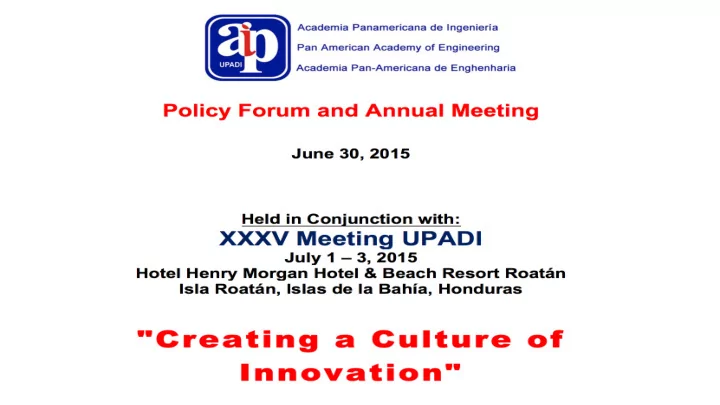

A STREET FESTIVAL ?
WORKPLACE CULTURE ?
NON-MATERIAL ISSUES ?
ALL OF THE ABOVE !!
CREATING A CULTURE OF INNOVATION Operative word is CULTURE Culture is that complex whole which includes Knowledge, belief, art, morals, law, custom, etc Material culture covers physical expressions thereof in science & engineering, technology, art Immaterial aspects covers intangibles of society social/political organizations, mythology, philosophy, literature “ CULTURE WILL EAT STRATEGT FOR LUNCH”… Drucker
CREATING A CULTURE OF INNOVATION The sum total of ways of living built up by a group of human beings and transmitted from one generation to another. A way of thinking, behaving, or working that exists in a place or organization (such as a business) The customs, arts, social institutions, and achievements of a particular nation, people, or other social group:
ARE WE DEALING WITH THE TIP OF THE ICEBERG?
MICRO OR MACRO INNOVATION “Micro -innovation" is not about revolutionary invention of business models or technology but rather customer experience oriented tweaks on existing products. Realistically modifying business models, improving product's functionality, or even beautifying user interface can all be called "micro- innovation“ Zhou Hongyi (2010) “Macro - innovation” may be related to major cultural changes leading to economic and social development throughout society as a whole; i.e. what is ideal is when the innovation correlates with trends that have macro or societal relevance. We define macro- innovation as changes in cultural patterns and regularities (i.e. social capital) which affect the agents’ abilities to attain individual or collective goals. Anonymous
A MACRO FRAMEWORK • Innovation depends upon both good macroeconomic policies at the national level, as well as the right mix of governance structures to ensure good coordination of policies. A solid, stable and predictable macroeconomic framework will encourage firms to invest and take risks. Thus, taxation, regulation, market access, competition, sound public finances and low and stable inflation, transparency and good public management; these all shape the environment for innovation.
THE COMMONS The commons is the cultural and natural resources accessible to all members of a society, including natural materials such as air, water, and a habitable earth. These resources are held in common, not owned privately. Today, the commons are also understood within a cultural sphere. These commons include literature, music, arts, design, film, video, television, radio, information, software and sites of heritage leading to the (production and maintenance of common goods )
THE COMMON GOOD…
ISSUES: Public Awareness Free and open communication with body politic Raising pubic awareness of importance of science & engineering Innovation is important to achieving national goals Research is in the public interest Transparency Anti-Corruption Trust
ISSUES: Enhanced Engineering Education Structure for continuous quality improvement Provision of additional resources for the educational system Encouragement of private-public partnerships Support for more full-time faculty Encourage more research and development Development of appropriate indicators to measure progress toward national goals i
ISSUES: Research Support for University research Increased percentage GDP for research Centers of excellence Private-public partnerships Improved tax structure Utilization of untapped resource
ISSUES: ICT Access Improved access to internet Enable effective communication among all concerned parties Exchange information among parties in creative process Enhanced quality of research Place a high value on innovation and entrepreneurship Remove commercial and regulatory rules that stifle creativity
ISSUES: Intellectual Property Adopt policies that enhance competitive advantage Facilitate participation in global markets Promote technical cooperation and capacity building Improve investment opportunities Enhance market access & technology transfer Unfettered access to the internet
CREATING A CULTURE OF INNOVATION Therefore to improve our social and economic conditions we must enlist: faculties and schools, GO’s & NGO’s , industry, professional associations, body politic In short, form partnerships, participate in the broader society, promote policies in the public interest “BETTER POLICIES FOR BETTER LIVES” OECD
MACRO INNOVATION - OECD Focus knowledge revolution on education and skills Insure business investments are in ‘Knowledge’ based capital Create value from data Protect Intellectual Property rights Target tax support in efficient ways
RECENT PROGRAM TOPICS PUBLIC TRUST PUBLIC AWARENESS CORRUPTION PUBLIC POLICY SOFT STUFF IS THE HARD STUFF
STRATEGIC LEVERS OF CULTURAL CHANGE " I see that culture isn’t just one aspect of the game— it is the game Culture is not one of those soft matters to be dealt with when the real business is done. The variables are the levers which enable or inhibit innovation. It is by managing these levers that an organization has the ability to influence its culture and to impact its ability to innovate.
LA TOP 10 MOST COMPETITIVE-DEFICIENCIES Labor market rigidities Poor quality of education Corruption Poor transport infrastructure High budget deficits Deterioration of functioning of institutions Low level of ICT Difficulty in accessing finance Poor macroeconomic performance
LEADERSHIP 101
Recommend
More recommend